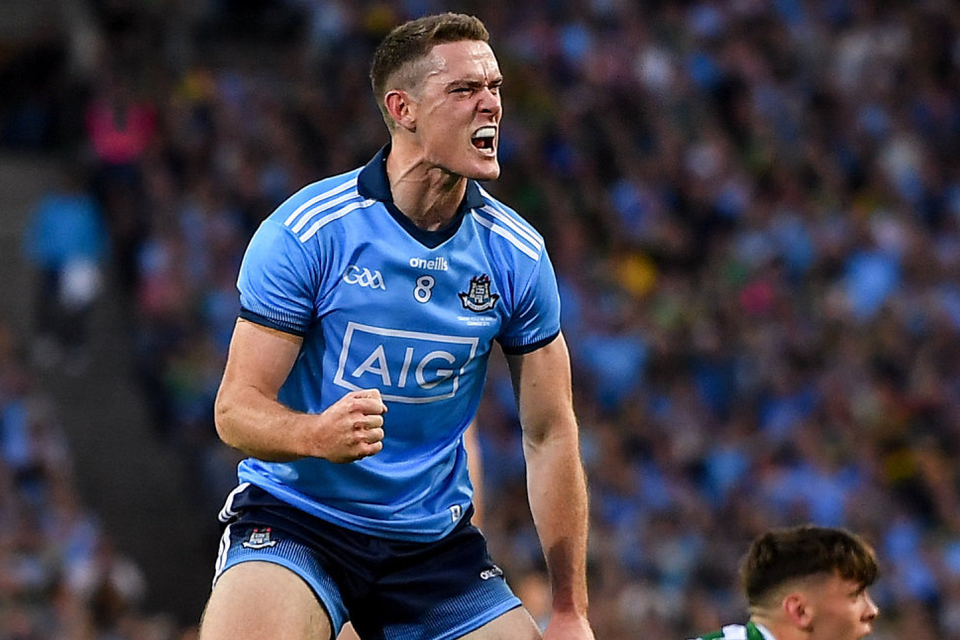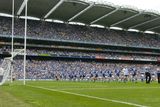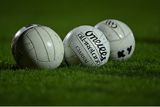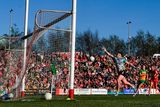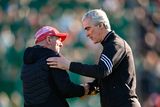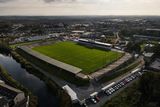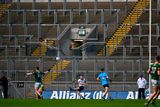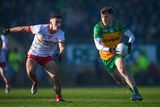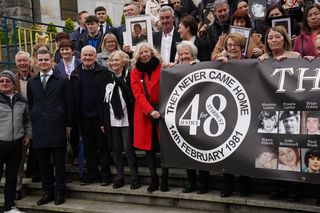Dermot Crowe: 'Dublin emerge from a fierce rivalry to claim immortality'
Brian Fenton after winning a free against Kerry last night. Photo: Seb Daly
Before the drawn game, public opinion had settled on one outcome and, it seemed, one outcome only. Dublin. Had to be. Kerry would eventually have their day. But those who swear allegiance to green and gold, as their tradition demands, cannot easily countenance such compliance and subordination.
So that even those who might have been born so recently as not to remember when they lorded it over Dublin would somehow innately know that they had every right to believe nonetheless. Because that's how it was, is and ever shall be.
And the history is woven into the tapestry, for all the talk of the next ball and the next game. Whatever is happening in the present, it is nothing without that context. In the same way, however long ago, the torment that drove Kevin Heffernan after losing the 1955 final to Kerry, leading to the re-emergence of Dublin in 1974 and the rivalry that followed, has a relevance today. It is why Heffernan, and Anton O'Toole, and Tim Kennelly, John Egan and Páidí Ó Sé never truly die in that sense. They are always with us, never more so than on a day like yesterday.
Kerry are young and coming, of that there is no doubt, and a fortnight ago they cheated time and mass expectation when nearly ending Dublin's dream of five in-a-row. Yesterday they gave their all in attempting to defy Dublin again, and ruin their plans for an unrivalled place in the history of Gaelic football. But history would not be held back. The force was with it and while Kerry still has more All-Irelands than any other county, Dublin included, it does not have what Dublin has now.
Their last time to lose to Kerry in the championship was ten years ago - how would that not rile the very essence of what Kerry stands for as a people and a tradition? The margin of loss then was 17 points. When Kerry demolished Dublin in 1978, ending their hopes of three in a row, the difference at the end was also 17 points by coincidence. Both were startling moments in time, and rude awakenings, for Dublin football in the context of that rivalry.
But it all changed with Kevin McManamon's goal in the final ten minutes of the 2011 final, when Kerry let a match they looked set to win slip from their grip. Out of that came a new reality.
The journey to yesterday's marvellous feat began there, and in countless other moments, but it essentially began when they defeated Kerry on a rainy day to win the 2015 All-Ireland final. Wet days like that favour the better team and the more technically accomplished. Dublin handled the elements better and won the match.
Jim Gavin had his second All-Ireland and a sense of redemption after losing to Donegal the year before in, astonishingly, his only loss in the championship as manager over seven seasons. From there they have swept many teams out of their way. But they have not won most All-Ireland finals easily. They have made their supporters sweat. And two weeks ago they were fortunate to survive against Kerry. Yesterday was hard work too for well over half the match.
The craving to complete the five in a row, being so tantalising near, may have added lead to their legs the first day. Kerry came like a fresh breeze and grew as a team; they came of age. But they are a more known quantity now as a result of it and they can't have but thought that they let Dublin, with their 14 men for 40 minutes, off the hook. For a Dublin team accustomed to thrashing teams, playing in third gear, this was an invaluable test of limb and constitution. Dublin's forwards managed just six points from play in the drawn match; this time they were not so easily contained. They scored 15.
And the most pleasing aspect of yesterday's win is that it was achieved through forward talent and brilliance. It was a forwards' day. A defender Jack McCaffrey was man of the match a fortnight ago, scoring 1-3 from play. This time Kerry put Diarmuid O'Connor on him and managed to reduce his influence significantly. After suffering an injury McCaffrey failed to come out for the second half. Diarmuid Connolly started the second half in his place, with James McCarthy reverting to half back and Brian Howard moving into midfield beside Brian Fenton.
The attack, which was mostly subdued in the drawn game, suddenly found its range. Kerry started nervously, standing off, deciding against pressing up on Stephen Cluxton's kick outs and invited Dublin on to them. Of their ten first half points one came from corner back Davy Byrne, the temptation to shoot when left in space near Kerry's goal proving irresistible.
After eight minutes Kerry were 0-1 to 0-5 down and Dublin's forwards were ominously on song. Ciaran Kilkenny, back to his best, finished with four points; he had three in the first half before Kerry moved the struggling Gavin Crowley off him. Con O'Callaghan also hit four, as did Paul Mannion. In the first half they also dropped three short and they only kicked four wides overall, the first not coming until 44 minutes in.
Kerry were game but they were wasteful. Paul Geaney and David Clifford, this time marked by Michael Fitzsimons from the start, each kicked four points from play, but Stephen O'Brien failed to register and they hit seven damaging second half wides, two from David Moran, that seemed to suck the life out of them. By the end they were out on their feet. They sent on Tommy Walsh and his first act was to win a free which gave Kerry a much needed score from Seanie O'Shea. O'Shea was chained throughout to John Small but still managed to kicked two points.
Their best goal chance was lost when O'Brien chose to go himself in the second half, the shot blocked by Cluxton, with better options at the Kerry man's disposal. In the first half Geaney also blasted over the bar from a good goalscoring position. And near the half-hour mark Con O'Callaghan escaped what should have been a yellow card when fouling Tadhg Morley after a swift Kerry counter attack involving excellent play by Clifford. All of these imperfections added up. Dublin were simply more clinical and the game's only goal from Eoin Murchan was invaluable in its timing right from the throw in at the start of the second half.
That was perhaps the most telling moment that showed it would be Dublin's day: the young Murchan, an unlikely goalscoring hero, showing Moran, 33, a clean pair of heels and then cooly placing the ball past Shane Ryan. Six points clear and safe, the final whistle confirmed Dublin had attained their immortality and a deserved place in the records. They did it playing an unrivalled brand of attacking football. That will be a fitting part of their legacy.
